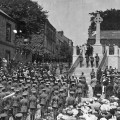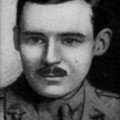
Gunner George James, of Littletown, County Durham
IN Memories 175, we left Gunner George James enduring heavy shellfire in the trenches near Ypres, in 1916. George, a miner from Littletown, near Durham City, was 21, and serving in the Royal Field Artillery.
We’ve been following his fortunes all year, seeing how events on the Western Front unfolded for him through his evocative diary.
This instalment brings us up to date with the progress of his war exactly 98 years ago.
April 26
ANOTHER casualty this morning.
One of our fitters shot under the eye. Lost his eye. He was a fine big lad, a good boxer. A German aeroplane brought down by one of our aeroplanes today. Pilot and observer both killed.
April 27
LAST night a furious, intense bombardment took place by the Germans on our front and a little to the right, opposite 17th Division. It lasted about four hours and during that time the Germans dropped a few thousand shells of all calibre in our lines, principally in the trenches.
We were sure it was the prelude to an attack. We retaliated very little.
The last four weeks we have been very quiet. We fired as little as possible, which was part of the scheme and the Germans, not accustomed to have so much of their own way, have probably become uneasy each day. They are puzzled and they got the wind up, I think. The only solution, I think, why they expended such an enormous amount of ammunition for practically no purpose at all is to give us a warning of what to expect if we dare to make an attack.
April 28
THE night was very quiet except for occasional bursts of rifle fire.
The morning is beautiful and quiet, almost too quiet.
April 30 (Sunday)
EARLY this morning the Germans attacked under cover of their gas on the left of 24th Division. They succeeded in breaking into our first line trenches, but were afterwards bombed out again. The gas was felt fairly strong in Baillieul, which is some distance back. Previous to the attack a German deserter gave us some very good warning. Our heavies fired a good deal today.
May 16
BEEN on furlough for a week. It does not bear writing about. This diary is suspended for an indefinite period.
“The earth is glad the very lark has poured
His early song against yon breezy sky
That spreads so clear o’er our solemnity.”
HAVING endured a couple of weeks of attacks by German shell and gas, George was withdrawn from the frontline in early May. His talk of a “furlough”
suggests that by mid-May, he was home in County Durham where, rather than dwell on the horrors, he preferred to think about a peaceful quote from John Keats.
It comes from an epic poem, Endymion, which is famed for its first line: “A thing of beauty is a joy forever.”
George, a nature-lover, was probably more interested in the idea of the lark singing so beautifully above the carnage down below.
It was a carnage to which he had to return. According to his family, as his last leave in Littletown came to an end, he knew he would never be back.
We’ll pick up George’s diary again in June when he is once again at the front, and witnessing the build up to July 1, 1916.





